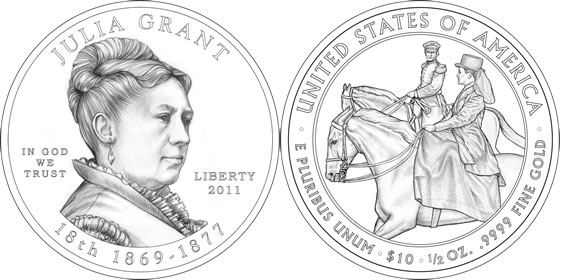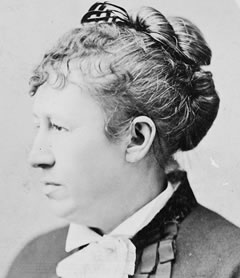Julia Grant First Spouse Gold Coins
Honoring the wife of the eighteenth President of the United States, the Julia Grant First Spouse Gold Coins mark the second of four First Spouse strikes to be released in 2011. They will be the nineteenth in the program overall which debuted in 2007.
All of the coins were authorized by the Presidential $1 Coin Act of 2005 which dictates that each strike feature a $10 face value and be struck from 1/2 ounce of 24-karat gold to either proof or uncirculated condition. The act also allows for bronze medal replicas of the Julia Grant First Spouse Gold Coins to be made by the United States Mint.
 As with all of the First Spouse Coins, the obverse (heads side) contains a portrait of the former First Lady, while the reverse (tails side) shows a scene from her life. For Julia’s reverse, a young Julia Dent and Ulysses S. Grant are portrayed, during which Grant was a West Point cadet, horseback riding at her family’s plantation known as White Haven. The U.S. Mint scheduled the launch of the coins for June 23, 2011.
As with all of the First Spouse Coins, the obverse (heads side) contains a portrait of the former First Lady, while the reverse (tails side) shows a scene from her life. For Julia’s reverse, a young Julia Dent and Ulysses S. Grant are portrayed, during which Grant was a West Point cadet, horseback riding at her family’s plantation known as White Haven. The U.S. Mint scheduled the launch of the coins for June 23, 2011.
Julia Grant Biography (1826-1902)

Julia was born to Frederick and Ellen Dent on January 26, 1826. Her father was the relatively successful owner of White Haven plantation near St. Louis, Missouri. With adequate resources, Julia was given an excellent education including several years study at Mauro Boarding School.
In 1844, she returned home from school to find a visiting Lieutenant Ulysses S. Grant, who was a friend of her brother Frederick’s – both of which attended the West Point Military Academy. Julia and Ulysses immediately took a liking to each-other, but there affections were not approved of by Julia’s father. He felt that Julia should marry someone who could provide a life of ease for her, and Ulysses could not on a soldier’s salary.
Despite the family’s misgivings, the two continued to court and were finally engaged (although they kept that a secret from her father for a year). The engagement would last for over four years as Ulysses was sent to fight in the Mexican-American War, during which time the couple only saw each-other once. Finally, her father reluctantly approved of the match and the two were married on August 22, 1848. Ulysses’ parents did not attend the wedding because they did not like the fact that Julia’s family owned slaves. (They later came to accept her, though).
The next years were hard for the Grant’s as Ulysses was sent from post to post. Julia, however, stayed at her husband’s side as much as she could and went about the business of setting up a household at each location to raise the growing family.
In 1854, Ulysses resigned from the Army only to find several years ahead that would be hard for the family. He tried his hand unsuccessfully at several ventures including farming and bill collecting before winding up as an assistant at his father’s tannery shop in Illinois.
Fame would soon fall on the family with the outbreak of the American Civil War. Ulysses would volunteer for the army again and quickly rose through the ranks, based both on his past experience and his military expertise. Eventually, Grant’s involvement in the War resulted in its end and in the Grants becoming quite famous.
Using that fame, Grant was elected to the Presidency in 1869 and would serve two full terms. Julia is said to have flourished in this new-found wealth and limelight. Always considered a "plain" woman, Julia used the position as First Lady to restore a level of elegance to the White House not seen in many years.
The official functions at the White House were elaborate with some meals lasting hours. She also went about the task of re-decorating the structure with new rugs and furniture. She insisted the place be deeply cleaned and only allowed her husband to smoke inside. For her husband’s two terms as President, Julia continued to insure that the White House was at the center of all of the social events of the capitol city.
When the two terms were over, Julia is said to have cried like a child upon leaving the White House as she had enjoyed her time there so much. Still, the Grants went on a world-wide tour which both were said to have enjoyed immensely.
Ulysses, who despite being adept at military maneuvers was prone to business failure, once again lost all of the family’s money in the mid-1880′s. Diagnosed with throat cancer, Grant raced to finish his memoirs before his death so that his family would have financial means.
With the funds from her husband’s book and with the stipend given to her from Congress, Julia lived a comfortable life and eventually returned to D.C. to become the "Grand Dame." She also took pen in hand later in life to become the first former First Lady to write her own memoirs.